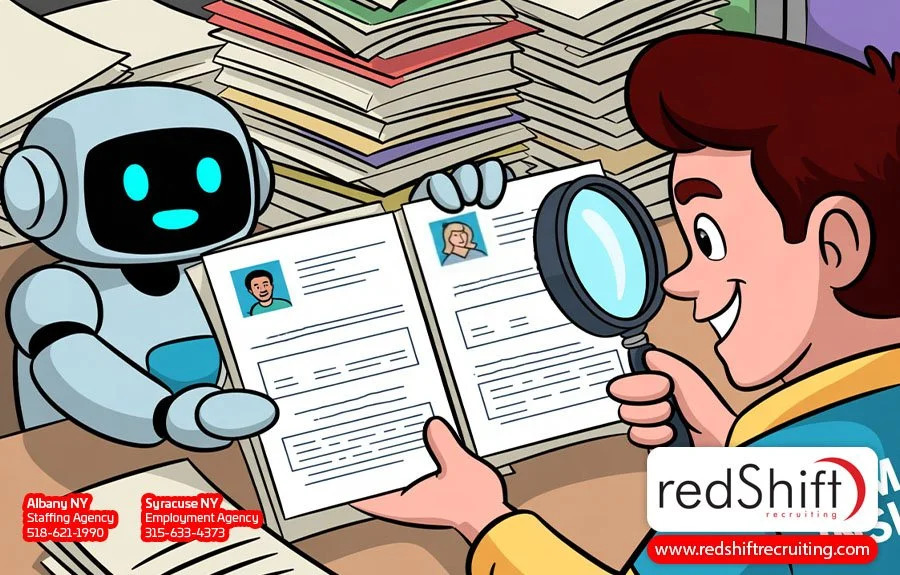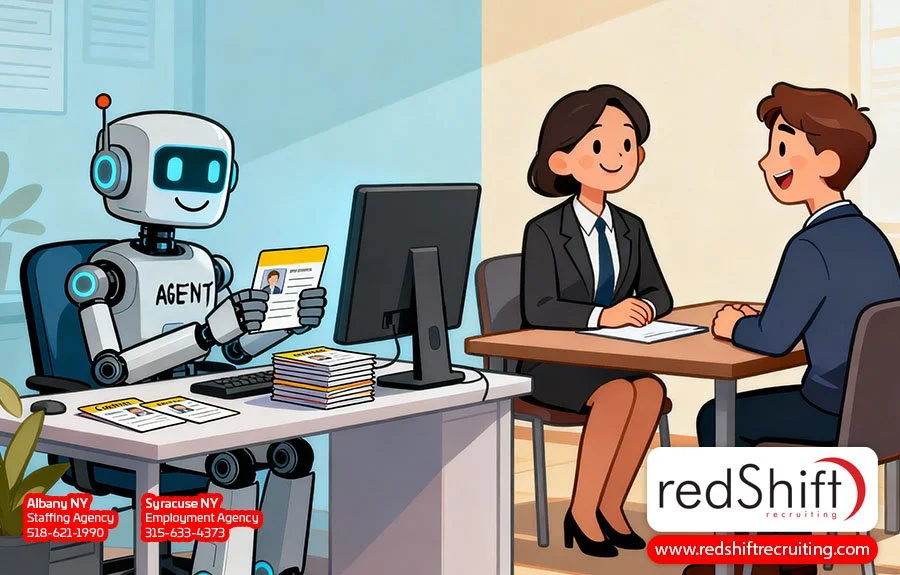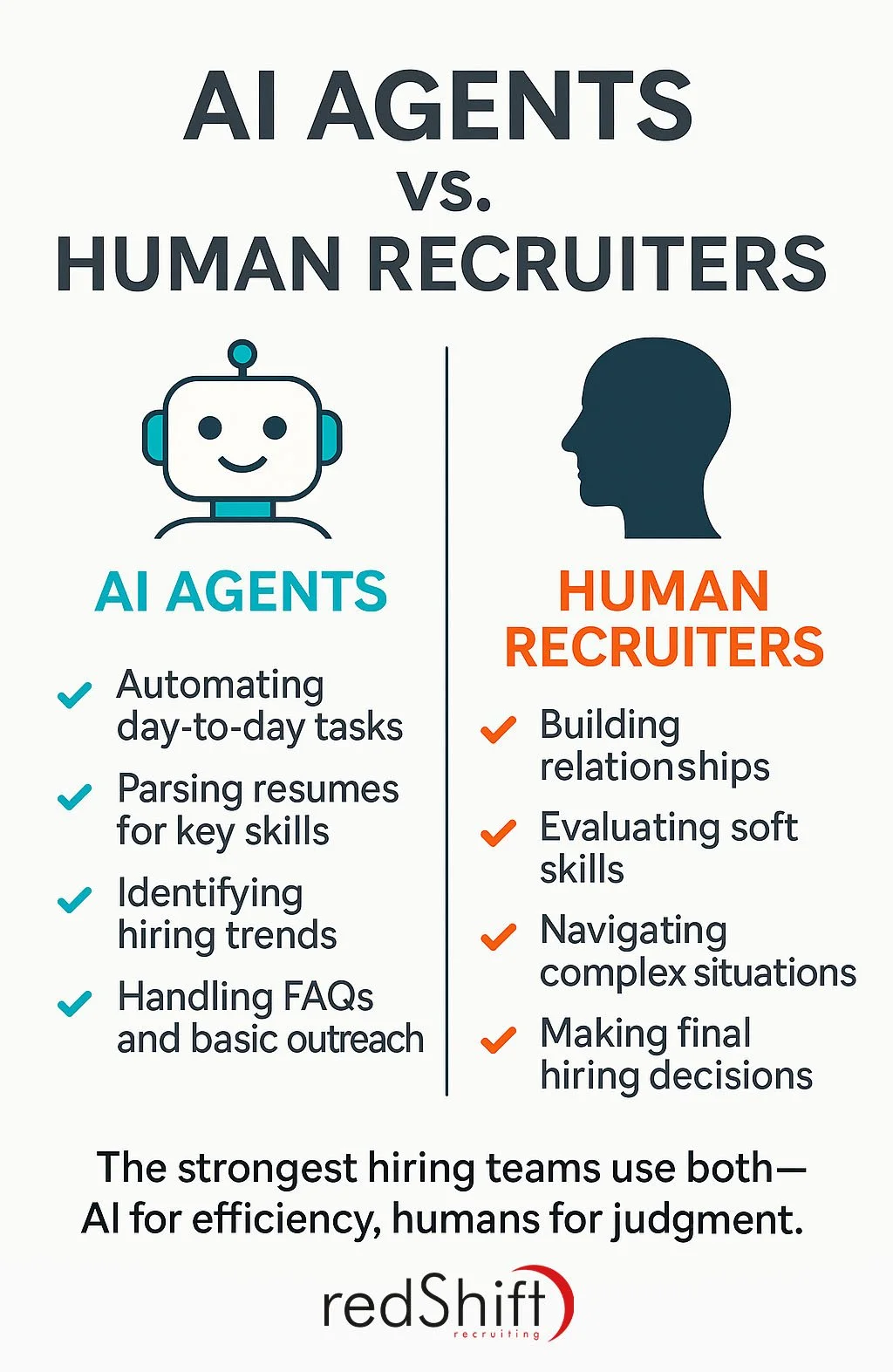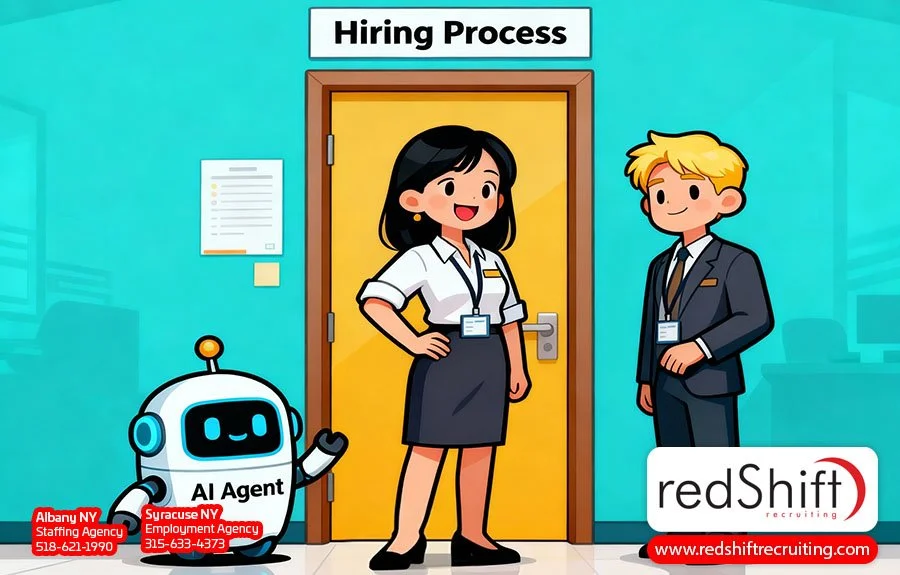Can AI Agents Replace Recruiters? A Practical Reality Check for Employers
You’re probably seeing them more and more—in your LinkedIn feed, mobile ads, sales emails, and every other digital touchpoint. Another HR-focused AI demo making the same bold claim: this time, the machine can handle recruiting on its own. With the McKinsey Global Survey on the State of AI in 2025 showing 62% of businesses have experimented with AI agents, it naturally raises the question: Can AI agents replace recruiters and take over the entire hiring process?
The AI Promise vs. The Human Reality
It’s tempting to think we’re just a software update away from AI-led recruiting. But the reality is far more interesting and nuanced. Yes, AI agents are reshaping the behind-the-scenes work of screening candidates, scheduling interviews, and streamlining workflows. They can sift through data at impossible speeds, automate repetitive tasks, and keep hiring pipelines moving with impressive efficiency. But they also reveal the limits of automation in a process built on trust, relationships, and real human decision-making.
Recruiting has always been more than matching resumes to job descriptions. It’s negotiation, cultural understanding, human intuition, and conversations that unfold in ways algorithms aren’t designed to navigate. In this article, we’ll explore what AI agents truly bring to the table, where they fall short, and why the future of recruiting will depend on the combined strengths of both technology and people. Whether you’re trying to hire better or trying to break into your next role, understanding that balance matters more now than ever.
What Are AI Agents in Recruiting?
AI agents are autonomous, AI-powered systems designed to perceive information, reason through tasks, act toward defined goals, and learn from outcomes over time. While standard AI tools focus on one user-directed task at a time, AI agents can carry out multi-step workflows without additional prompting, refine their actions based on results, and operate with much more independence within complex AI systems.
For hiring teams, this adaptability means less time tied up with routine tasks and more spent on assessments and decisions that truly require human judgment. Technologies such as natural language processing (NLP), machine learning models, and pattern-recognition algorithms help agents read and interpret large volumes of text, identify qualified candidates, and communicate in ways that feel more conversational and even personal. A 2024-2025 study published by the Hr.Research Institute powered by HR.com found that about half of organizations now use AI in at least one part of their hiring process, from creating job descriptions and filtering resumes to interacting with applicants and coordinating interviews.
When used effectively, these tools are changing workplace productivity in exciting ways, helping hiring teams work both faster and smarter, without losing the human element. As they become better at handling consistent, repeatable tasks, AI agents give recruiters more room to focus on the parts of hiring that rely on intuition, communication, and real human connection.
Want a deeper explanation of how AI agents work behind the scenes? Check out our full guide on AI agents and where they fit into modern hiring.
What AI Agents Can Do in Recruiting
As new technologies allow job seekers to mass apply to dozens of roles at the touch of a button, recruiters are dealing with far more inbound volume than ever before, pushing many to enlist AI recruitment tools of their own just to keep up. AI agents can absorb much of that initial load, helping teams sift through large applicant pools quickly and focus on candidates who meet the job requirements. They're especially effective at handling the structured, repeatable parts of hiring that tend to slow teams down, and they can chain steps together—screening a candidate, drafting outreach, and scheduling interviews—without additional prompting. When used thoughtfully, they combine AI’s efficiency with the consistency recruiters need to streamline high-volume workflows and reduce manual effort.
Initial Sourcing & Screening
Automate resume parsing to pull out relevant skills, experience, and credentials.
Match applicants to job descriptions using predefined criteria.
Flag unqualified candidates based on missing must-have keywords, such as required skills, degrees, or certifications.
Support recruiting workflows by generating quick, consistent shortlists of qualified candidates.
Candidate Engagement (Early Hiring Stages)
Automate FAQs and basic inquiries, improving early candidate engagement.
Send application follow-ups and reminders to improve communication and support a positive candidate experience.
Handle early-stage interview scheduling through chatbots or automated calendar tools.
Conduct structured initial interviews using AI voice agents under human supervision. Interestingly, in a large 2025 field study by the University of Chicago Booth School of Business, many candidates who completed an AI interview positively compared the experience to speaking with a person, often finding it less intimidating than the traditional interview format.
Data Analysis & Insights
Identify hiring trends and potential bottlenecks.
Use predictive analytics to estimate candidate fit or likelihood of progressing.
Provide early signals of bias or drift in screening decisions, supporting a fair hiring process.
Administrative & Workflow Tasks
Coordinate calendars, send notifications, and update applicant tracking system (ATS) records.
Draft job posting templates based on role type and seniority.
Orchestrate multi-step tasks like screening → outreach → scheduling without new prompts.
Templated Personalized Outreach
Draft outreach messages based on preset frameworks and candidate profiles.
Provide structured follow-ups that remain consistent across large applicant pools.
Some platforms now include AI voice agents, which can deliver short scripted messages or reminders without adding workload to recruiting teams.
AI agents aren’t replacing the nuanced parts of recruiting, but they excel at the routine administrative tasks. When human recruiters offload these early-stage and repetitive tasks, they have more time for the conversations, evaluations, and decisions that move the hiring process forward.
What AI Agents Cannot Do: The Human Expertise That Still Matters
While AI helps reduce routine work and human fatigue, the core decisions that determine team quality, alignment, and long-term success still depend on people, not algorithms. Some limitations of AI agents include:
Human Insight & Emotional Intelligence
AI cannot replicate emotional intelligence—understanding tone, sensing hesitation, or reading between the lines.
It struggles with nuances that require human insight, especially when motivations, career goals, or personal circumstances are complex or sensitive.
Difficult and sensitive conversations still require the human touch, especially when candidates need clarity or reassurance.
Relationship Building & Trust
Genuine relationship building between candidates and hiring managers depends on credibility, rapport, and real human communication.
AI cannot cultivate long-term trust or tailor conversations to individual personalities or working styles.
In the human versus machine dynamic, most professionals still expect meaningful interaction with an actual person.
Cultural Fit & Soft Skills Assessment
AI can’t reliably evaluate soft skills such as leadership potential, collaboration style, adaptability, or communication strength.
A true cultural fit assessment requires understanding company culture, team dynamics, and unwritten expectations.
The more ambiguous or people-dependent the role, the more essential human interpretation becomes.
Complex Negotiation & Stakeholder Management
Offer discussions, competing priorities, counteroffers, and real-time negotiation rely on interpersonal skills and trust.
AI struggles to manage multiple stakeholders with different pressures or concerns.
The more complex or critical hires become, the more vital it is for humans to interpret context and guide decisions.
Strategic Talent Advisory
Workforce planning, market insights, compensation strategy, and strategic decision-making require human experience and business context.
AI cannot effectively guide employer branding or tailor hiring strategies to long-term business goals.
Human expertise is what leads to superior hiring outcomes, not automated scripts.
Ethical Oversight & Bias Judgment
While AI can identify patterns, significant concerns persist about relying on agents to make hiring decisions without human oversight.
Humans must interpret patterns, contextualize recommendations, and act ethically upon their conclusions.
Regulations and quality standards depend on strict human oversight to maintain fairness and reduce liability.
Compliance, Liability, & Brand Risk
Fully autonomous hiring pipelines introduce significant legal, reputational, and quality-control risks, making them currently unrealistic.
AI systems must be monitored closely to ensure decisions align with applicable policies and laws.
Even efficient tools must be implemented thoughtfully to preserve the candidate experience and safeguard brand trust.
Ultimately, AI can speed up the early steps of hiring, but it cannot replace the interpersonal, contextual, and strategic work that defines effective recruiting. The moments that matter most—insight, trust, influence, and final decisions—still belong to humans.
Can AI Replace Recruiters? The Evolving Role of Human Hiring Specialists
Even with rapid improvements in automation, there are clear limits to what AI agents can take on in the hiring process. Recruiting is still a human-centered discipline, shaped by intuition, trust, and context—areas where human judgment consistently outperforms automation. For that reason, industry experts predict AI will not replace human recruiters, but it will reshape the recruiter’s role and the day-to-day responsibilities of talent acquisition teams.
From Transactional to Transformational Work
AI handles much of the repetitive administrative work, allowing recruiters to focus on higher-value tasks that require human expertise. This shift reflects a broader move toward augmented intelligence—using AI to elevate human capability rather than replace it. As a result, recruiters spend more time on strategic thinking, market insight, advising clients, and influencing hiring decisions that determine long-term success.
High-Touch Human Interaction
Deep interviews, coaching candidates, aligning expectations with hiring managers, and building relationships all rely on empathy and nuance. These interactions directly influence an organization’s ability to secure top talent, and they remain outside the reach of any automated system. In terms of return on investment, AI voice agents, automation tools, and other early-stage screening systems can reduce administrative time, but they are most effective when paired with the human interaction that shapes trust, alignment, and final decisions.
Recruiters as “Agent Orchestrators”
Rather than competing with AI, modern recruiters increasingly act as orchestrators overseeing, validating, and correcting AI outputs to ensure accuracy and fairness. Effective use of AI still requires human input to interpret context, adjust recommendations, and validate results—and to prevent the unintended consequences of overly literal automation, biased model outputs, and algorithmic decisions that miss key human nuance.
Data Interpreters & Decision Partners
AI can highlight patterns, identify bottlenecks, and generate metrics, but it cannot reliably convert those insights into strategies tailored to your business. Recruiters translate data into real hiring plans, align recommendations with business goals, and help teams make the hiring decisions that directly impact performance, culture, and retention.
Future-Proofing Hiring: Practical Steps for Employers & Human Recruiters
As AI becomes a standard layer in talent acquisition, HR leaders should focus less on whether AI can run their recruiting department, and more on how humans and machines can work together to build a more efficient hiring process and a better candidate experience.
Building AI literacy is the first step. Recruiters need to understand where agents excel and where technology still fails to match human expertise. Even as tools improve, they cannot fully replace human recruiters, especially for roles requiring judgment, persuasion, or reading social cues.
The second step is deepening the skills only people can bring. As automation trims early-stage tasks, recruiters will spend more time evaluating how candidates think, adapt, collaborate, and communicate. These qualitative differences matter most for complex or leadership-oriented roles—the very areas where research shows AI still struggles. Meanwhile, real-time evaluation tools and automated hiring tests may shorten the interview process for more structured positions, giving recruiters space to differentiate top talent or re-engage passive candidates who need personalized, strategic outreach. Recruiters who master negotiation, communication, and strategic thinking will be best positioned to guide both hiring managers and job seekers through these changes.
Finally, future-ready hiring teams will strengthen their strategic capabilities. As AI offers more data, recruiters must become skilled interpreters, turning signals into insights that support workforce planning, compensation discussions, employer branding, and long-term talent strategy. This requires closer collaboration across HR, IT, and business leadership to ensure AI is used ethically, safely, and effectively. Organizations that invest in upskilling and redefine the recruiter’s role around analysis, influence, and human judgment will be far better prepared than those waiting for technology to “solve” hiring on its own.
Frequently Asked Questions
How Accurate Are AI Agents at Predicting Whether a Candidate Will Succeed in a Role?
AI agents can identify patterns, highlight trends, and use predictive analytics to estimate potential fit, but their accuracy is limited by the quality and completeness of the data they’re trained on. They’re effective for identifying basic qualifications and past performance indicators, but they cannot reliably assess the interpersonal, contextual, or ambiguous factors that often determine long-term success in a job. For that reason, employers should treat AI-generated predictions as one input—not a hiring decision.
Do Candidates Trust AI Agents During the Recruiting Process?
Candidate trust varies widely. Some job seekers appreciate the speed and convenience of automated updates or AI-led interviews, while others disengage if the process feels impersonal or lacks transparency. Many candidates are open to AI-assisted steps early in the process, but still expect meaningful human interaction before making decisions. The most effective hiring teams balance automation with authentic communication.
How Should HR Teams Evaluate Whether an AI-Powered Recruiting Tool Is Trustworthy?
HR teams should look for transparency in how the system makes decisions, ongoing monitoring for bias, and clear controls for adjusting or overriding AI recommendations. Tools should also allow full auditability—employers need to clearly understand why a candidate was flagged or filtered out. Most importantly, a trustworthy solution must enhance human decision-making rather than make final decisions on its own.
How Does AI Adoption Change Collaboration Between HR Teams and Hiring Managers?
AI increases operational speed, which requires tighter alignment between HR leaders, hiring managers, and recruiting teams. Faster shortlists, automated insights, and early screening signals mean teams must agree on job requirements, evaluation criteria, and decision timelines upfront. When used well, AI strengthens collaboration by creating shared data, clearer expectations, and more time for strategic conversations.
What Risks Do Employers Face If AI-Driven Hiring Decisions Are Challenged Legally?
The biggest risks stem from consistency, fairness, and documentation. If an automated system screens out candidates unfairly, employers are responsible for proving the process was job-related and compliant with applicable laws. Without strong human oversight, organizations may face exposure around disparate impact, biased model outputs, and unclear decision pathways. Any AI tool used in hiring must be validated, monitored, and carefully documented.
Conclusion
Ultimately, AI agents can reshape how recruiting work gets done, but artificial intelligence can't replace the people who make hiring effective. Talent acquisition teams that pair AI’s efficiency with human judgment, context, and relationship-building can create a hiring process that’s faster, fairer, and far more strategic than automation alone. The organizations that invest in upskilling their recruiters, strengthening human relationships, and using AI intentionally will be best positioned to hire well in a rapidly changing market.
Article Author:
Ashley Meyer
Digital Marketing Strategist
Albany, NY







